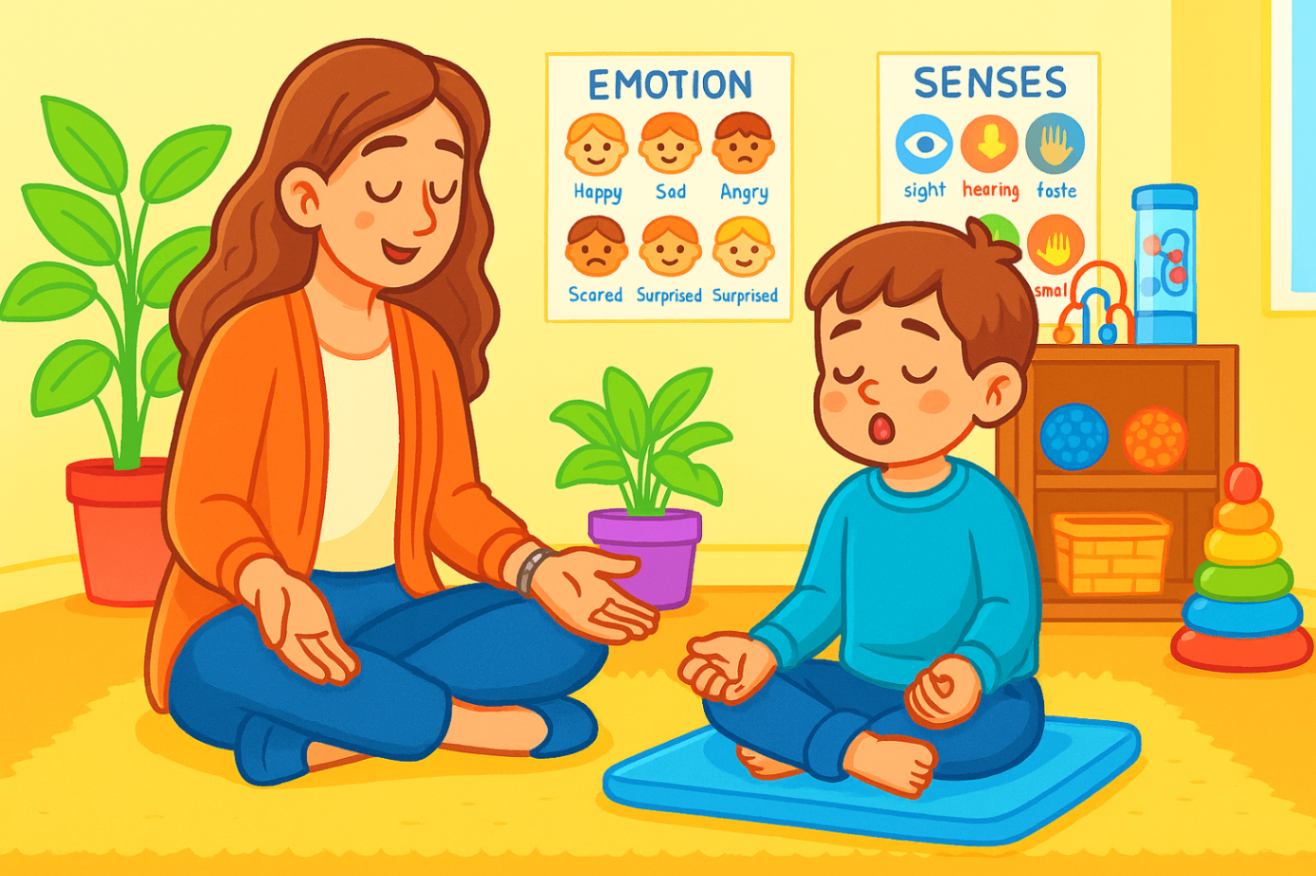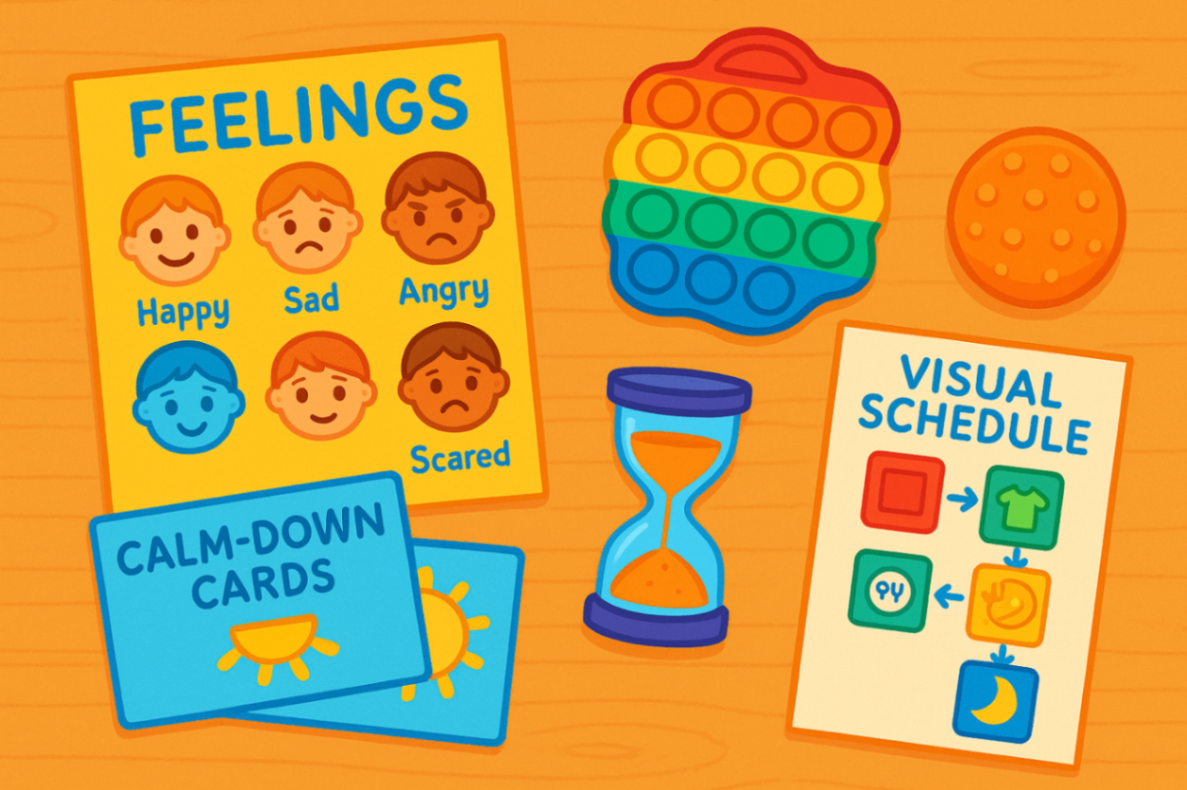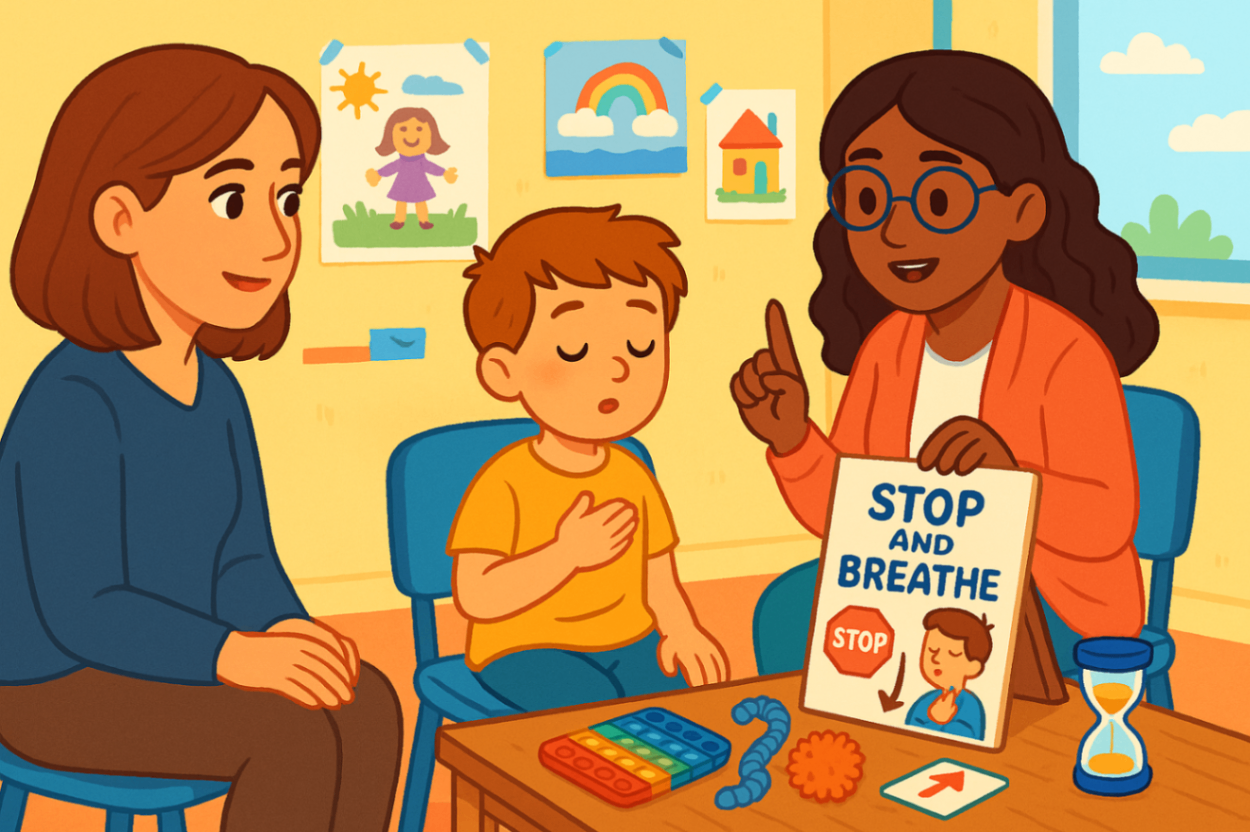
emotional regulation: specialised behaviour support in liverpool
19 June, 2025
Latest Update: November 20, 2025
Introduction
Children who struggle to manage big emotions often carry the burden beyond the moment — it can affect them at home, at school and in their social lives. For families in Liverpool, specialist help from daar provides evidence-based strategies for emotional regulation through specialised behaviour support (SBS). Our registered practitioners partner with children, families and schools to build consistent, meaningful behaviour change that reaches every setting.
Key Highlights
-
Specialised behaviour support in Liverpool equips children with the skills needed to regulate their emotions and tackle challenging behaviour effectively.
-
Positive behaviour support (PBS) provides evidence-based strategies to develop lasting emotional regulation skills.
-
Parent training programs and family involvement ensure consistent progress in managing bad behaviour at home and school.
-
Interventions address biological and environmental factors that affect children’s mental health and psychosocial disabilities.
-
Collaboration with schools, local area coordinators, and allied health professionals builds a holistic approach for quality of life improvement.
-
Tailored behaviour plans aim to enhance family economic participation and personal recovery through structured support.
Why Emotional Regulation Can Be Challenging for Children
 Emotional regulation isn’t simply about staying calm — it’s about recognising, understanding and responding to feelings in ways that support growth, relationships and learning. When children lack the tools for this, behaviours like meltdowns, avoidance, aggression or withdrawal can take over. Persistent emotional dysregulation may lead to difficulties at school, impact friendships and place stress on family routines. Specialist behaviour support offers a proactive solution.
Emotional regulation isn’t simply about staying calm — it’s about recognising, understanding and responding to feelings in ways that support growth, relationships and learning. When children lack the tools for this, behaviours like meltdowns, avoidance, aggression or withdrawal can take over. Persistent emotional dysregulation may lead to difficulties at school, impact friendships and place stress on family routines. Specialist behaviour support offers a proactive solution.
Emotional Regulation & Behaviour Support in Liverpool
As of 2025, emotional regulation is increasingly understood as a core skill for children’s wellbeing, participation and school success. Local families in Liverpool are benefitting from specialised behaviour support (SBS) that not only addresses behaviour of concern but explicitly teaches emotional self-regulation, coping strategies and consistency across home, school and community.
Key developments include:
-
Providers offering mobile, in-home, school and telehealth delivery across Liverpool suburbs (Casula, Moorebank, Prestons, Wattle Grove).
-
Stronger collaboration between behaviour practitioners, speech/OT/psychology to support emotion regulation.
-
Goals that emphasise what the child will do (e.g., request a break instead of meltdown) rather than only what they won’t do.
-
Data-driven measurement of emotional-regulation improvements, enabling smoother NDIS plan reviews.
Why Emotional Regulation Matters for Children & Families
Children who cannot regulate big emotions often face challenges such as:
-
Frequent meltdowns, avoidant behaviours, aggression or withdrawal
-
Trouble engaging in school, with peers or in community activities
-
Increased stress for parents/carers, siblings and families
When children gain emotional regulation skills, families notice improved participation, calmer routines and stronger relationships. By focusing support on the root causes (triggers, responses, environment) rather than just reacting to behaviours, lasting change becomes possible.
Causes of Emotional Regulation Difficulties
Some children struggle with emotional regulation for different reasons. Neurodevelopmental conditions, like autism spectrum disorder and ADHD, can make it hard for them to handle big emotions or deal with changes. The way the brain works and mental health play a big part in how kids cope with what they feel.
Family stress and things happening around them can also make it tough. Not all parents use the same rules or support, which can add to these problems. If people use helpful steps and work on what causes the stress, it will help kids understand what they feel. This can lead to better emotional and behavioural growth over time.
Biological and Environmental Factors
The start of emotional dysregulation can come from both the body and the world around us. Are you aware of these causes?
-
Biological factors: The way the brain grows, our genes, and our body’s health take part in how this issue starts. For younger children, things happening in the brain can make it harder for them to handle feelings.
-
Environmental factors: The way parents act, and things like big changes, or too much noise, stress, or movement, can make distress worse.
-
Mental health aspects: A child who feels unsettled might have anxiety or changing mood. These can be caused by outside things and how open the child is to these pressures.
When you see how these go together, you can start looking for good ways to help your child. The PBS framework brings knowledge from each area for the best way forward with emotional regulation and mental health in younger children.
The Role of Neurodevelopmental Conditions (e.g., Autism, ADHD)
Neurodevelopmental conditions like autism and ADHD can really shape how children handle their own emotions. Many young people with these conditions have trouble with emotional regulation. This often leads to what people call 'big emotions.' Because of this, they might act without thinking or have meltdowns. These things can make social situations much harder for them.
It is important to give children the right support. Using things like positive behaviour support (PBS) and other focused help can build essential emotional regulation skills. Good support helps these children be better at handling their feelings and actions. In the end, it can raise their quality of life and encourage their own personal recovery.
How Specialised Behaviour Support Builds Emotional Regulation Skills
-
Assessment of the emotional triggers: Behaviour practitioners observe and gather data across settings to understand what precedes and follows challenging behaviours.
-
Designing a tailored plan: With the insights from the assessment, the team creates a plan grounded in PBS (Positive Behaviour Support) or other evidence-based interventions that target emotional regulation and replacement skills.
-
Teaching new coping and regulation strategies: Rather than simply suppressing behaviour, the focus is on teaching skills — such as identifying feelings, using calming strategies, requesting breaks, or self-regulating through movement or visuals.
-
Coordinating across environments: The plan is applied consistently across home, school and community, so children experience the same support and strategies wherever they are.
-
Review and adaptation: Emotional regulation needs evolve as children grow, so regular reviews ensure the plan remains aligned to your child’s goals, behaviours and changes in environment.
Key Strategies Used in Specialised Behaviour Support
 Specialised Positive Behaviour Support (PBS) uses set ways to help with emotional regulation. One big part is making a behaviour support plan. The plan shows steps based on best practices. It helps kids face hard things in a better way.
Specialised Positive Behaviour Support (PBS) uses set ways to help with emotional regulation. One big part is making a behaviour support plan. The plan shows steps based on best practices. It helps kids face hard things in a better way.
A trained group of clinicians also carries out a Functional Behaviour Assessment (FBA). This is done to look at what starts behaviour problems. This check makes sure each plan fits what the person needs. Using PBS steps can improve quality of life for families. PBS looks at root causes and lets families see steady progress.
Functional Behaviour Assessment
Functional Behaviour Assessment (FBA) is vital in pinpointing why challenging behaviours occur. Clinicians leverage FBA to create tailored interventions that match each child’s unique needs. But how is it structured?
|
FBA Component |
Description |
|---|---|
|
Antecedents |
Identify situations or events that precede challenging behaviours. |
|
Behaviour Analysis |
Describe problematic actions, such as meltdowns or impulsive responses. |
|
Consequences |
Explore the outcomes or reinforcements linked to these behaviours. |
This systematic tool ensures that PBS plans address the root cause of bad behaviour effectively. Transitioning to strategies aligned with real-life triggers fosters lasting emotional improvements.
Why Local Delivery in Liverpool Matters
Support works best when it fits into everyday life. Families across Liverpool, Casula, Moorebank and nearby suburbs trust daar because our teams deliver services in-clinic, at home or in other familiar settings. This means:
-
Strategies transfer quickly into the places your child learns and interacts.
-
Therapists understand the local schools, routines and community context.
-
Your child receives consistent support across settings and contexts.
How the NDIS Supports Emotional Regulation Through SBS
When emotional and behavioural difficulties impact participation, the National Disability Insurance Agency (NDIA) may fund specialised behaviour support through your child’s NDIS plan. These supports help develop long-term regulation skills, reduce reliance on reactive strategies and build independence. At daar, we guide families through the process — from identifying the right funding category to selecting a registered practitioner and implementing the plan.
What Families Can Expect from the Process
-
An initial consultation and assessment to gather a full picture of your child’s emotional regulation and behaviour needs.
-
A written behaviour support plan with clear goals, strategies and roles for family, school and therapists.
-
Parent & carer training so you feel confident applying strategies in everyday routines.
-
Regular monitoring, progress updates and flexible service delivery to suit your child and family schedule.
-
Multi-setting coordination — each part of your child’s world works together toward the same goals.
How daar Helps Families Build Emotional Regulation Skills in Liverpool
At daar, our NDIS-registered behaviour support team specialises in helping children and teens in Liverpool and nearby suburbs strengthen emotional regulation skills. We provide:
-
Complete Functional Behaviour Assessment (FBA)
-
Tailored Behaviour Support Plans (BSP) with emotion-regulation focus
-
Parent/carer training, teacher support, sibling involvement
- Data-tracking, progress reports and plan-review readiness
Our focus is to build confident, resilient children who know how to manage their emotions and engage meaningfully in life.
Book Personalised Emotional Behaviour Support Today
We align with NDIS frameworks, including psychosocial disability support, to ensure your family can access the right resources at the right time. With tools designed to reduce distress and build self-regulation skills, your child will gain the confidence and strategies needed to thrive at home, in school, and in the community.
Families in Liverpool, Casula, Moorebank, Prestons, Wattle Grove, Mount Pritchard, Lurnea, Cartwright, Hinchinbrook, Warwick Farm, Chipping Norton, Green Valley, Ashcroft, Sadleir, and Glenfield can access our services — in clinic or via telehealth.
Take the next step today — book a consultation and start building a more confident future for your child.
Frequently Asked Questions
How do I know if my child needs behaviour support for emotional regulation?
Some signs that your child may need help with emotional regulation are having a lot of meltdowns, finding it hard to handle frustration, not following daily routines, and having problems with friends or family. If you see these things often and they make daily life hard for your child, it could be good to get support from a professional. This help can make a big difference in your child's growth and emotional regulation.
How long does it take to see progress with specialised behaviour support?
Progress with specialised behaviour support is different for each person. You may start to see changes in a few weeks, but sometimes it can take months. This depends on the needs of the person, how much consistency there is with the behaviour strategies used, and how much help they get from those who care for them. All these things work together to show when and how improvement happens.
Is PBS covered by the NDIS in Australia?
Yes, you can get Positive Behaviour Support through the NDIS if you or your child are eligible. Families can talk to NDIA experts. You can also use the psychosocial disability access factsheet to get help and answers about how to use PBS in your child's mental health support. This can be a good way for people with a psychosocial disability to get help through the NDIS.
.svg)

















